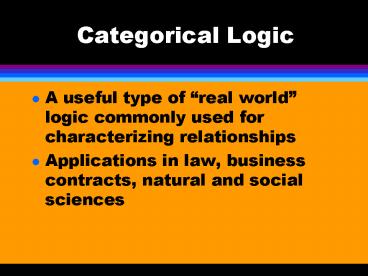Categorical Logic - PowerPoint PPT Presentation
1 / 11
Title:
Categorical Logic
Description:
... and Y must be nouns or noun phrases. Categorical Claims. A: ... The Square of Opposition. Claims of different types with the same subject and predicate terms are ... – PowerPoint PPT presentation
Number of Views:111
Avg rating:3.0/5.0
Title: Categorical Logic
1
Categorical Logic
- A useful type of real world logic commonly used
for characterizing relationships - Applications in law, business contracts, natural
and social sciences
2
Categorical Claims
- Categorical claims relate two different concepts
to each other. - Each concept must be expressed as a noun or noun
phrase. - Standard form claims are the simplest way to
express categorical relationships.
3
Categorical Claims
- Many natural language statements can be expressed
as standard form categorical claims. - There are only four forms or statement types in
which standard form categorical claims occur.
They are designated A, E, I, and O.
4
Categorical Claims
- A All X are Y
5
Categorical Claims
- A All X are Y
In natural language Every X is a Y. Each X is
a Y. If it is an X, then it is a Y. All Xs are
Ys. Any X is a Y. All non-Ys are non-Xs. Only
Ys are Xs The only Xs are Ys
6
Categorical Claims
- A All X are Y
In natural language Every X is a Y. Each X is
a Y. If it is an X, then it is a Y. All Xs are
Ys. Any X is a Y. All non-Ys are non-Xs. Only
Ys are Xs The only Xs are Ys Note X and Y must
be nouns or noun phrases.
7
Categorical Claims
- A All X are Y
- E No X are Y
8
Categorical Claims
- A All X are Y
- E No X are Y
- I Some X are Y
9
Categorical Claims
- A All X are Y
- E No X are Y
- I Some X are Y
Note The range of some in categorical logic is
from as few as one to as many as all of the
things in the category.
10
Categorical Claims
- A All X are Y
- E No X are Y
- I Some X are Y
- O Some X are not Y
11
A-claim
E-claim
I-claim
O-claim
The Square of Opposition Claims of different
types with the same subject and predicate terms
are corresponding claims.































